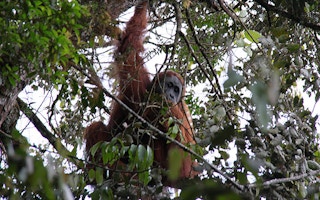Oil palm plantations continue to grow in Aceh, Indonesia’s westernmost province on the island of Sumatra. Last March they covered 393,270 hectares of land, nearly 7 per cent of Aceh’s total area, according to the Indonesian Forum for the Environment (Walhi), an NGO. The figures are based on government data, Walhi said.
Nagan Raya regency – a regency is a subdivision of a province – ranks first in oil palm coverage, with 82,252 hectares, almost a quarter of its area. Nagan Raya lies on Aceh’s western coast. Next comes East Aceh regency, with 60,592 hectares, or 9 per cent of its area, and Aceh Singkil regency, with 55,441 hectares, or 25 per cent of its area.
Some of the plantations are owned by large companies, others by small farmers. Not all of it is legal. The head of Aceh Tamiang regency, which has endured devastating flash floods as a result of upstream deforestation, is overseeing a campaign to eradicate illegal plantations, even felling one of the rogue trees himself.
Oil palm plantations are also expanding into Aceh’s priceless Leuser Ecosystem, the only place on earth where Sumatran tigers, orangutans, rhinos and elephants all still coexist.
A class action lawsuit is pending against the Aceh government’s new spatial plan to zone the province for development. Critics fear the plan, which fails to mention the nationally mandated Leuser Ecosystem, will set Aceh on a path to ecological ruin.
This story was published with permission from Mongabay.










